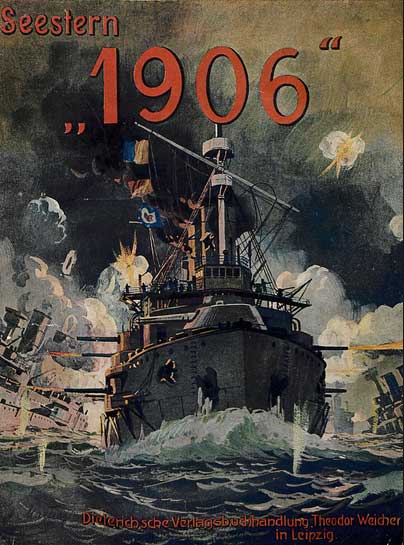Seestern [Ferdinand Heinrich Grautoff ] (1906) Der Zusammenbruch der alten Welt
Ferdinand Heinrich Grautoff (1907) Armageddon 190- by Seestern ; translation by G. Herring ; with an introduction by E. R. Fremantle, London, Kegan Paul, Trench, Trübner
Translator’s Preface:
As this book is being introduced to English readers by so distinguished a god-parent as Sir E. Fremantle, there is no need for the translator to dwell upon its value. In view of the result of the recent German elections, however, it is not without interest to remember that it is now some fifteen months since it was originally published in Germany, that it rapidly reached a circulation of 100,000 copies, and since that time—whether coincidence or otherwise—a pacific spirit appears gradually to have prevailed among the German people, while a more concentrated persistence has none the less been directed by them to the strengthening and increasing of their fleet.
It is, as Sir E. Fremantle implies, instructive to see ourselves occasionally in the mirror of foreign opinion, and not less so to find that a thoughtful German writer, who evidently from the reception his book has met with reflects the attitude of many of his countrymen, regards with genuine horror the prospect of an inter-European war.
Seestern, as he calls himself, still retains his anonymity. Speculation has variously ascribed his work to the Emperor, to different distinguished naval officers, and—less frequently— to prominent journalists. The first-mentioned guess is of course not correct.
Seestern’s book has earned its reputation in Germany for the originality and shrewdness of its conclusions, and, hardly less, for the marvelous accuracy of its details. Consequently, its translation demanded exceptional care, and the frequent revisions necessary have taken considerable time. I should like to take this opportunity of acknowledging the debt under which I feel myself to those who have generously given me their help or advice, in particular to Captain Oliver Stokes, R.N., for his. hints re service technicalities, and to Mr. B. W. Willett, whose assistance has been simply invaluable. Some few unimportant emendations have been introduced, for instance, in the less vital details where the author’s unfamiliarity with things English is very pardonable, or where it has been possible to bring a sentence up to date. Such alterations are, however, few and trifling, as I have felt that it would be unwarranted on my part to twist or adorn a book that had already earned such well-merited laurels. Even had I hacked and mutilated it to introduce, say, our newly-launched Dreadnought into its pages, obviously the matter could not rest there, and I should have found myself very soon far beyond the limits of adaptation accorded even to a free ” translation. The same applies to what may seem somewhat curious parliamentary procedure. My endeavour, on the contrary, has been to reproduce the original as exactly as translation allowed, even at the risk of possible occasional lapses into words and expressions un-English. In this endeavour I trust, though I dare not be confident, that I have succeeded.
G. HERRING.

INTRODUCTION
IT is refreshing to read this anonymous book, which, with its general accuracy of detail, has been unmistakably “made in Germany,” after the numerous sketches of future European wars with which we have been favoured by British writers. In the latter we have our shortcomings and unreadiness consistently brought forward in the laudable desire to call attention to defects, and to our fundamental disregard of the necessity for making adequate preparation for war in piping times of peace.
In the book before us, the writer, on the contrary, depicts this country in a Machiavelian light, plotting to force a war upon innocent Germany, while as regards our navy, at least, he is fully appreciative of its instant readiness for war,” and its general efficiency. Thus, while he extols the splendid courage and devotion of the officers and men of the Imperial German Navy, he acknowledges that they meet their match in the personnel ” of our own service, and he points a moral against his countrymen in relying on smaller ships less powerfully armed.
Full text (USA Access only) : http://babel.hathitrust.org/cgi/pt?id=umn.31951002101500t;view=thumb;seq=1


